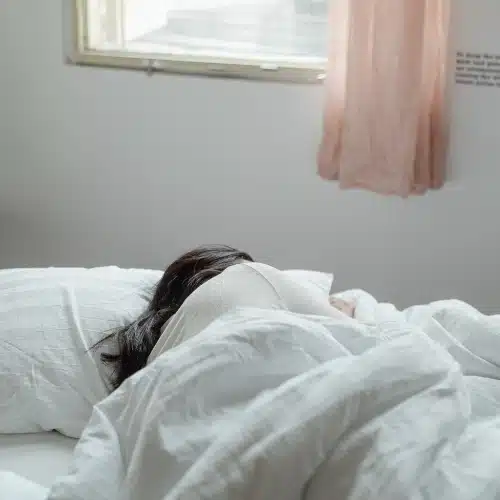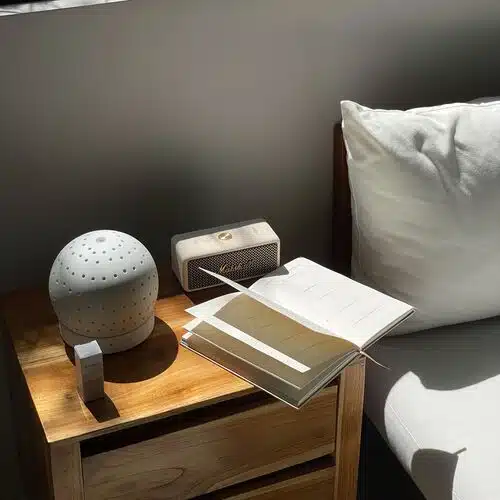Waking up feeling renewed has you in a better state to take on the day. On the other hand, a restless night can leave you feeling sluggish, irritable, and foggy, with that undeniable urge to reach for caffeine or sugar to get through the day. But what are the benefits of good sleep? And how does sleep help cope with stress?
Sleep is more than just rest – it’s a driver of wellbeing. A good night’s sleep helps to regulate emotions, restore energy, and support cognitive function, making it an essential part of stress management¹. Without sufficient sleep, the body struggles to maintain its balance, leading to increased stress levels and less mental resilience. Think you can’t train yourself to switch off and unwind? Think again. When you approach sleep intentionally and create nourishing bedtime rituals, you can naturally nurture your mind and body, fostering a deeper connection with yourself and the capacity to embrace each day with renewed energy.
This guide explores the research-backed strategies that help you improve sleep, manage stress, and cultivate a deeper sense of wellbeing.
the benefits of good sleep
Quality sleep does more than just help you feel rested – it directly impacts our mental health and how we manage stress. Research², including a meta-analysis of 65 clinical trials with over 8,600 participants, highlights the following benefits:
- Significant reductions in depression, anxiety, and rumination
- Easing of stress and psychosis symptoms
- Improvement in emotional stability and mental clarity.
This reinforces that sleep isn’t just restorative – it actively supports better mental wellbeing. Other benefits of good sleep include:
- Better cognitive function and memory
- Improved immune system function
- Reduced inflammation
- Better physical health and increased energy levels
- Healthy skin and a glowing complexion³.
Essentially, better sleep means better physical and mental health inside and out.

the benefits of good sleep
Quality sleep does more than just help you feel rested – it directly impacts our mental health and how we manage stress. Research², including a meta-analysis of 65 clinical trials with over 8,600 participants, highlights the following benefits:
- Significant reductions in depression, anxiety, and rumination
- Easing of stress and psychosis symptoms
- Improvement in emotional stability and mental clarity.
This reinforces that sleep isn’t just restorative – it actively supports better mental wellbeing. Other benefits of good sleep include:
- Better cognitive function and memory
- Improved immune system function
- Reduced inflammation
- Better physical health and increased energy levels
- Healthy skin and a glowing complexion³.
Essentially, better sleep means better physical and mental health inside and out.
how does sleep help us cope with stress?
Sleep and Stress Management
Sleep also plays a leading role in regulating stress hormones, particularly cortisol. When we’re well-rested, our bodies are better equipped to manage daily stressors, maintaining a sense of calm and balance. Lack of sleep, however, disrupts the body’s ability to regulate cortisol levels, leading to heightened feelings of stress and overwhelm throughout the day.
Elevated cortisol levels can lead to irritability, difficulty concentrating, and an overall feeling of being on edge. The brain doesn’t differentiate between sources of stress – it simply registers a surge in cortisol, the stress hormone that keeps you alert, wired, and restless while the world sleeps.
Long-term sleep deprivation can make it harder to cope with everyday challenges, ultimately impacting mental wellbeing. Prioritising good sleep hygiene is one of the simplest yet most effective ways to build resilience against stress.

the connection between sleep and mental wellbeing
Sleep and mental wellbeing, being so deeply interconnected, influence and amplify each other. Lower stress levels lead to better sleep, while quality rest improves resilience to stress. Scientific research⁴ highlights that mindfulness, meditation, and relaxation techniques not only promote restful sleep but also improve emotional regulation and overall wellbeing.
During sleep, the brain processes emotions and consolidates memories, allowing us to wake up feeling refreshed and ready to take on the day. Poor sleep, on the other hand, has been linked to increased feelings of anxiety and depression. The studies suggest that chronic sleep deprivation can directly impact mood regulation and overall mental health.
Integrating stress-reduction strategies into your daily routine means you create a cycle of wellness that supports both mental and physical health. Prioritising breathwork, massage, and relaxation rituals can transform sleep into a powerful tool for stress management and long-term balance.

the connection between sleep and mental wellbeing
Sleep and mental wellbeing, being so deeply interconnected, influence and amplify each other. Lower stress levels lead to better sleep, while quality rest improves resilience to stress. Scientific research⁴ highlights that mindfulness, meditation, and relaxation techniques not only promote restful sleep but also improve emotional regulation and overall wellbeing.
the connection between sleep and mental wellbeing
During sleep, the brain processes emotions and consolidates memories, allowing us to wake up feeling refreshed and ready to take on the day. Poor sleep, on the other hand, has been linked to increased feelings of anxiety and depression. The studies suggest that chronic sleep deprivation can directly impact mood regulation and overall mental health.
Integrating stress-reduction strategies into your daily routine means you create a cycle of wellness that supports both mental and physical health. Prioritising breathwork, massage, and relaxation rituals can transform sleep into a powerful tool for stress management and long-term balance.
the connection between sleep and skin health
Lack of sleep doesn’t just impact stress levels – it can also affect skin health⁵. When we sleep, our skin undergoes a natural repair process, producing collagen and combating oxidative stress. Poor sleep can lead to dullness, dehydration, and increased signs of ageing. Maximising sleep quality with nourishing nighttime skincare, such as hydrating serums or overnight masks, can support skin rejuvenation while promoting relaxation.
how to fall (and stay) asleep
- Create a nighttime ritual: Doing relaxing activities before bed, such as reading, deep breathing, or using an overnight face mask, can signal to the body that it’s time to wind down.
- Make your bedroom a sleep-worthy sanctuary: Sleep and darkness are the ultimate pairing, so keeping the bedroom dark and free of distractions encourages restful sleep.
- Disconnect from tech: Limiting exposure to blue light from devices before bed supports the natural production of melatonin, the sleep hormone. Make a conscious effort to unplug from your devices and ease into relaxation well before bedtime – even swapping screen time for a book can help signal to your body that it’s time to unwind.
- Use holistic wellness products: Incorporating sleep-enhancing products, such as sleep tea, diffusers, or nighttime skincare treatments, can help create a calming bedtime routine. Again, signalling to your body that it’s time to unwind does a lot for a restful night’s sleep.

supporting your wellbeing beyond sleep
While sleep is a foundation of stress management, additional wellness practices can further boost mental and emotional resilience. Guided meditations, mindful breathing exercises, and self-care rituals can all contribute to a sense of balance.
For a complete approach to wellbeing, consider combining good sleep habits with regular spa treatments designed to alleviate stress and encourage relaxation. In a feasibility trial conducted by Dr Hayley Dickinson⁶, our Organic Relax Massage was shown to decrease heart rate by up to 10.6%. This reduction in heart rate indicates a relaxation response to the treatment.
prioritise sleep for a balanced life
Sleep is not just a necessity, it’s one of the best tools for managing stress and improving overall wellbeing. By prioritising restful shuteye, we support our body’s natural ability to heal, recharge, and face challenges with a clear mind. Incorporating small changes into your nightly routine, such as reducing screen time, using sleep-supporting products, and embracing calming rituals, can lead to better balance in your life and a healthier you.
You deserve to experience wellbeing, starting with a good night’s sleep.
references
¹Scott, A.J., Webb, T.L., Martyn-St James, M., Rowse, G. & Weich, S., 2021. Improving sleep quality leads to better mental health: A meta-analysis of randomised controlled trials. Sleep Medicine Reviews, 60, p.101556. Available at: https://www.ncbi.nlm.nih.gov/pmc/articles/PMC8651630/ [Accessed 10 Apr. 2025].
²Scott, A.J., Webb, T.L., Martyn-St James, M., Rowse, G. & Weich, S., 2021. Improving sleep quality leads to better mental health: A meta-analysis of randomised controlled trials. Sleep Medicine Reviews, 60, p.101556. Available at: https://www.ncbi.nlm.nih.gov/pmc/articles/PMC8651630/ [Accessed 10 Apr. 2025].
³Chen, Y. & Lyga, J., 2014. Brain-skin connection: stress, inflammation and skin aging. Inflamm Allergy Drug Targets, 13(3), pp.177–190. Available at: https://www.ncbi.nlm.nih.gov/pmc/articles/PMC4082169/ [Accessed 10 Apr. 2025].
⁴Source: https://www.sciencedirect.com/science/article/abs/pii/S2352250X15001554
⁵Source: https://pmc.ncbi.nlm.nih.gov/articles/PMC4082169/#:~:text=Skin%20mast%20cells%20are%20activated,psoriasis%20and%20pruritus%20%5B217%5D.
⁶Dickinson, H., 2015. Organic Relax Massage Feasibility Trial Report. Endota Spa. Available at: https://endotaspa.com.au/media/wysiwyg/blogs/dr-hayley/massage-research/Dr_Hayley_Research_Paper_-_Massage.pdf [Accessed 10 April 2025].

